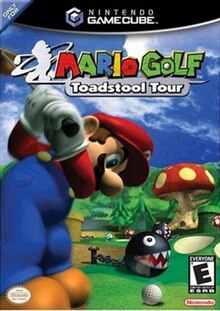
Back ماريو غولف: تودستول تاور Arabic ماريو جولف: تودستول تاور ARZ Mario Golf: Toadstool Tour Spanish Mario Golf: Toadstool Tour Finnish Mario Golf: Toadstool Tour French Mario Golf: Toadstool Tour Italian 마리오 골프: 패밀리 투어 Korean Mario Golf: Toadstool Tour LLD Mario Golf: Toadstool Tour Dutch Mario Golf: Toadstool Tour Polish
| Mario Golf: Toadstool Tour | |
|---|---|
 North American box art | |
| Developer(s) | Camelot Software Planning |
| Publisher(s) | Nintendo |
| Director(s) | Haruki Kodera |
| Producer(s) | Shinji Hatano Hiroyuki Takahashi Shugo Takahashi |
| Designer(s) | Hiroyuki Takahashi Shugo Takahashi |
| Programmer(s) | Haruki Kodera Toru Takamatsu Kazunori Mimori |
| Composer(s) | Motoi Sakuraba |
| Series | Mario Golf |
| Platform(s) | GameCube |
| Release | |
| Genre(s) | Sports |
| Mode(s) | Single-player, multiplayer |
Mario Golf: Toadstool Tour, known in Japan as Mario Golf: Family Tour (マリオゴルフ ファミリーツアー, Mario Gorufu Famirī Tsuā), is a 2003 sports game developed by Camelot Software Planning and published by Nintendo for the GameCube. It is the sequel to the 1999 Nintendo 64 title Mario Golf, and is the third game in the Mario Golf series. It was released in North America on July 28, 2003, in Japan on September 5, 2003, and in PAL regions in 2004.
Toadstool Tour is a golf game featuring characters and elements from the Mario series. There are 16 playable characters in total, each with a set of golfing statistics defining their style of play. The game's main mode involves the player competing in tournaments to obtain new features, although there are alternative modes consisting of a training session and variations to the golf format. This includes "Ring Attack", requiring the player to hit the ball through rings of varying sizes while remaining on or under par.[1] The game also features connectivity with Mario Golf: Advance Tour using the Nintendo GameCube Game Boy Advance cable.[2]
Toadstool Tour was met with positive reception. In general, reviewers praised the game's visuals, sound, and variety of courses, although a perceived lack of advancement from its predecessor was criticised. The game became part of the Player's Choice label in 2004.[3]